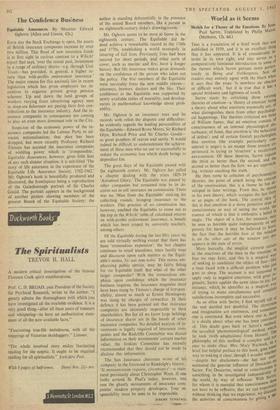The Confidence Business
Equitable Assurances. By Maurice Edward Ogborn. (Allen and Unwin. 42s.)
EACH day the Stock Exchange is open, the assets of British insurance companies increase by over two million. This flood of new insurance funds is at first sight in curious contrast to a Which? report that says, 'over the recent past, investment in a range of ordinary shares—e.g. through Unit Trusts—has provided, in general, a higher re- turn than with-profits endowment insurance.' The major reason for this anomaly lies in recent legislation which has given employers tax in- centives to organise private group pension schemes. Up and down the land groups of workers varying from advertising agency men to deep-sea fishermen are paying their first con- tributions to the insurance industry. And the in- surance companies in consequence are coming to play an even more dominant role in the City.
Suspicion of the economic power of the in- surance companies led the Labour Party to ad- vocate nationalisation; that plan has been dropped, but more recently Professor Richard Titmuss has accused the insurance companies of wielding power which is 'irresponsible.' Equitable Assurances, however. gives little hint of any such sinister situation; it is sub-titled 'The story of life assurance in the experience of the Equitable Life Assurance Society, 1762-1962.' Mr. Ogborn's book is beautifully produced and illustrated, the frontispiece being a reproduction of the Gainsborough portrait of Sir Charles Gould. The portrait appears in the background of another picture showing members of the present Board of the Equitable Society; the
author is standing deferentially in the presence of the seated Board members, like a parson in an eighteenth-century duke's drawing-room.
Mr. Ogborn seems to be most at home in the eighteenth century. The Equitable did in- deed achieve a remarkable record in the 1760s and 1770s, establishing a world monopoly in insuring of full lives. Previously lives had been insured for short periods, and other sorts of cover, such as marine and fire, have a longer history. But life insurance makes great demands on the confidence of the person who takes out the policy. The first members of the Equitable were inevitably from the new middle classes— attorneys, brewers, doctors and the like. Their confidence in the Equitable was supported by newly available tables of mortality, and develop- ments in mathematical knowledge about prob- ability.
Mr. Ogborn is an insurance man and he records with relish the disputes and difficulties; he evidently regards the leading personalities of the Equitable—Edward Rowe Mores, Sir Richard Glyn, Richard Price and Sir Charles Gould- - as great prophets of reason and sanity. It would indeed be difficult to underestimate the achieve- ment of these men who set out so successfully to reduce the economic loss which death brings to dependent kin.
The great days of the Equitable passed with the eighteenth century Mr. Ogborn has called a chapter dealing with the years 1829-39 'Autumnal Glory.' The Equitable was passed by other companies but remained true to its de- cision not to sell insurance on commission. There was no 'Man from the Equitable' making his collecting rounds. bringing insurance to the workers. This practice of no commission has, however, enabled the Equitable to come out at the top in the Which? table of calculated returns on with-profits endowment insurance, a benefit which has been reaped by university teachers, among others.
Of the Equitable during the last fifty years we
are told virtually nothing except that there has been 'tremendous expansion'; the last chapter continues to retail anecdotes, trace family trees and discourse upon such matters as the Equit- able's motto, Sic nos non nobis This motto, em- phasising public service, may be fairly fitting for the Equitable itself. But what of the other larger companies? With the tremendous em- phasis upon confidence which the insurance business requires, the insurance magnates must have been stung by Titmuss's charge of irrespon- sibility, almost as much as Ernest Hemingway
was stung by charges of cowardice. In their defence it has been pointed out that insurance companies are ultimately responsible to their shareholders. But for all we know large holdings of insurance shares are in the hands of other insurance companies. No detailed analysis of in- vestments is legally required of insurance com- panies and the Radcliffe Committee was denied information on their investments' current market value; the Jenkins Committee has recently recommended that they should not be made to disclose this information.
The Sun Insurance chairman wrote of his company in the foreword to Randolph's history: 'Si monument:Int requiris, circionspice.—a state- ment previously about Christopher Wren. If one looks around St. Paul's today, however, one sees the ghastly monuments of insurance com- panies' modern property developers. True re- sponsibility must be seen to be responsible.
JEREMY TUNSTALL






























 Previous page
Previous page